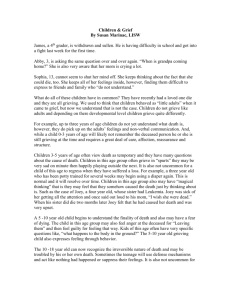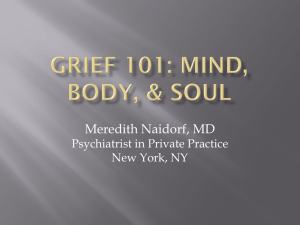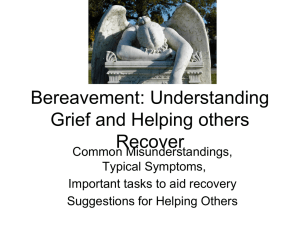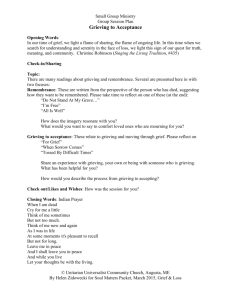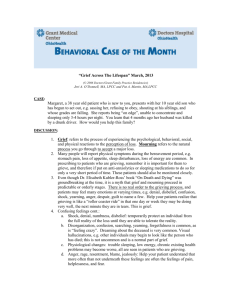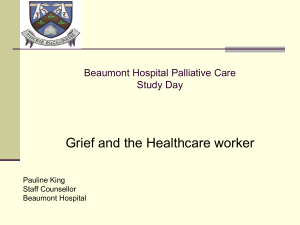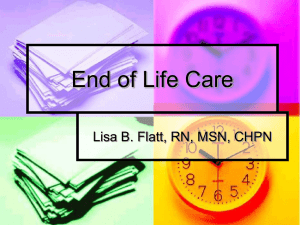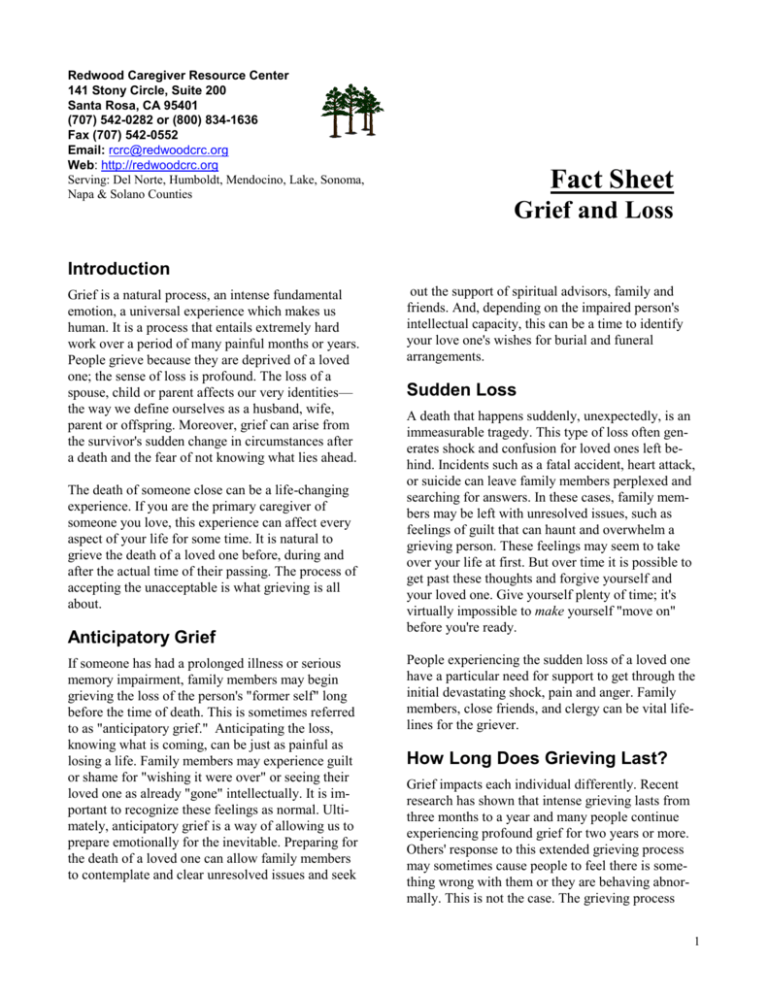
Redwood Caregiver Resource Center
141 Stony Circle, Suite 200
Santa Rosa, CA 95401
(707) 542-0282 or (800) 834-1636
Fax (707) 542-0552
Email: rcrc@redwoodcrc.org
Web: http://redwoodcrc.org
Serving: Del Norte, Humboldt, Mendocino, Lake, Sonoma,
Napa & Solano Counties
Fact Sheet
Grief and Loss
Introduction
Grief is a natural process, an intense fundamental
emotion, a universal experience which makes us
human. It is a process that entails extremely hard
work over a period of many painful months or years.
People grieve because they are deprived of a loved
one; the sense of loss is profound. The loss of a
spouse, child or parent affects our very identities—
the way we define ourselves as a husband, wife,
parent or offspring. Moreover, grief can arise from
the survivor's sudden change in circumstances after
a death and the fear of not knowing what lies ahead.
The death of someone close can be a life-changing
experience. If you are the primary caregiver of
someone you love, this experience can affect every
aspect of your life for some time. It is natural to
grieve the death of a loved one before, during and
after the actual time of their passing. The process of
accepting the unacceptable is what grieving is all
about.
Anticipatory Grief
If someone has had a prolonged illness or serious
memory impairment, family members may begin
grieving the loss of the person's "former self" long
before the time of death. This is sometimes referred
to as "anticipatory grief." Anticipating the loss,
knowing what is coming, can be just as painful as
losing a life. Family members may experience guilt
or shame for "wishing it were over" or seeing their
loved one as already "gone" intellectually. It is important to recognize these feelings as normal. Ultimately, anticipatory grief is a way of allowing us to
prepare emotionally for the inevitable. Preparing for
the death of a loved one can allow family members
to contemplate and clear unresolved issues and seek
out the support of spiritual advisors, family and
friends. And, depending on the impaired person's
intellectual capacity, this can be a time to identify
your love one's wishes for burial and funeral
arrangements.
Sudden Loss
A death that happens suddenly, unexpectedly, is an
immeasurable tragedy. This type of loss often generates shock and confusion for loved ones left behind. Incidents such as a fatal accident, heart attack,
or suicide can leave family members perplexed and
searching for answers. In these cases, family members may be left with unresolved issues, such as
feelings of guilt that can haunt and overwhelm a
grieving person. These feelings may seem to take
over your life at first. But over time it is possible to
get past these thoughts and forgive yourself and
your loved one. Give yourself plenty of time; it's
virtually impossible to make yourself "move on"
before you're ready.
People experiencing the sudden loss of a loved one
have a particular need for support to get through the
initial devastating shock, pain and anger. Family
members, close friends, and clergy can be vital lifelines for the griever.
How Long Does Grieving Last?
Grief impacts each individual differently. Recent
research has shown that intense grieving lasts from
three months to a year and many people continue
experiencing profound grief for two years or more.
Others' response to this extended grieving process
may sometimes cause people to feel there is something wrong with them or they are behaving abnormally. This is not the case. The grieving process
1
depends on the individual's belief system, religion,
life experiences, and the type of loss suffered.
Prolonged bereavement is not unusual. Many people
find solace in seeking out other grievers or trusted
friends. However, if feelings of being overwhelmed
continue over time, professional support should be
sought.
Symptoms of Grief
Grief can provoke both physical and emotional
symptoms, as well as spiritual insights and turmoil.
Physical symptoms include low energy or exhaustion, headaches or upset stomach. Some people will
sleep excessively, others may find they are pushing
themselves to extremes at work. These activity
changes may make an individual more prone to illness. It is important to take care of yourself during
this period of bereavement by maintaining a proper
diet, exercise and rest. Taking care of your body can
help heal the rest of you, even if you do not feel inclined to do so.
Emotional symptoms include memory gaps, distraction or preoccupation, irritability, depression,
euphoria, wailing rages and passive resignation.
Some people identify strongly with the person who
died and his/her feelings. If you have experienced a
loss and are hurting it is reasonable that your responses may seem "unreasonable." Nonetheless, it is
important not to judge yourself too harshly as you
experience conflicting and overwhelming emotions.
Like grief itself, people's coping strategies vary.
Some people cope best through quiet reflection, others seek exercise or other distractions. Some have a
tendency to engage in reckless or self-destructive
activities (e.g., excessive drinking). It is vital to obtain support in order to regain some sense of control
and to work through your feelings. A trained counselor, support group, or trusted friend can help you
sort through feelings such as anxiety, loss, anger,
guilt, and sadness. If depression or anxiety persist, a
doctor or psychiatrist may prescribe antidepressant
drugs to help alleviate feelings of hopelessness.
Spirituality: you may feel closer to God and more
open to religious experiences than ever before. Conversely, many people express anger or outrage at
God. You may feel cut off from God or from your
own soul altogether—a temporary paralysis of the
spirit. If you are a person of faith, you may question
your faith in God, in yourself, in others or in life. A
member of the clergy or spiritual advisor can help
you examine the feelings you are experiencing.
Learning to deal with grief is learning to live again.
Stages of Grief
Often portrayed as a grief "wheel," these stages do
not necessarily follow a set order. Some stages may
be revisited many times as an individual goes
through a grieving period.
Shock.
Emotional release.
Depression, loneliness and a sense of isolation.
Physical symptoms of distress.
Feelings of panic.
A sense of guilt.
Anger or rage.
Inability to return to usual activities.
The gradual regaining of hope.
Acceptance as we adjust our lives to reality.
Most people who have lost someone close go
through all or some of these stages, although not
necessarily in this specific order. This kind of
healthy grieving can help a person move through a
significant loss with minimal harm to self, either
physical or mental.
Ethical Issues
Often family members and caregivers are faced with
the decision to allow someone to die naturally or to
prolong their death and maintain life through artificial means. Physician training, hospital and nursing
home policies often dictate the use of "heroic
means" to sustain life. "Reviving" a very ill person
after a stroke or using a respirator for someone
deemed medically "brain dead" are standard procedures used in many hospitals.
If at all possible, it is important to learn and document a person's wishes about using artificial life
support before any crisis arises. A living will or durable power of attorney for health care (DPAHC)
2
expresses a person's wishes when he or she can no
longer speak for him/herself. These documents can
help instruct hospitals or nursing homes on an appropriate course of action to be taken at a critical
moment. By law, all hospitals must now inform patients about their right to fill out these documents.
When a person is confused, or otherwise unable to
express preferences, family members are often put
in the position of becoming surrogate decision makers. Such decisions present a thorny array of medical, legal, and moral questions. Decisions to provide
or withhold life support are based on personal values, beliefs, and consideration for what the person
might have wanted. Such decisions are painful.
Family members should give themselves ample time
to cope with these life and death decisions and to
process feelings of doubt or blame which may surface.
Tips for Helping the Bereaved
Be available. Offer support in an unobtrusive
but persistent manner.
Listen without giving advice.
Do not offer stories of your own. This can have
the effect of dismissing the grieving person's
pain.
Allow the grieving person to use expressions of
anger or bitterness, including such expressions
against God. This may be normal behavior in an
attempt to find meaning in what has happened.
Realize that no one can replace or undo the loss.
To heal, the individual must endure the grief
process. Allow him/her to feel the pain.
Be patient, kind and understanding without being patronizing. Don't claim to "know" what the
other person is feeling.
Don't force the individual to share feelings if
he/she doesn't want to.
Physical and emotional touch can bring great
comfort to the bereaved. Don't hesitate to share
a hug or handclasp when appropriate.
Be there later, when friends and family have all
gone back to their routines.
Remember holidays, birthdays, and anniversaries which have important meaning for the bereaved. Offer support during this time. Don't be
afraid of reminding the person of the loss;
he/she is already thinking about it.
Practical Assistance
for the Bereaved
Things a person can do without asking:
Send a card or flowers.
Bring food.
Water or mow their lawn.
Donate blood.
Contribute to a cause which is meaningful to
your friend or family member.
Things a person can do to help but should ask first:
Offer to stay in the home to take phone calls,
receive food and guests.
Offer child care on a specific date.
Offer to care for pets.
nOffer transportation.
Credits
Ballard, E. L., Managing Grief and Bereavement: A
Guide For Families and Professionals Caring for
Memory Impaired Adults and Other Chronically Ill
Persons, Duke Family Support Program,
Durham, NC.
Bozarth-Campbell, A., 1982, Life Is Goodbye, Life
Is Hello, CompCare Publications, Minneapolis, MN.
Harris Lord, J., 1990, Beyond Sympathy, Pathfinder
Publishing, Ventura, CA.
Sankar, Andrea, 1991, Dying at Home: A Family
Guide for Caregiving, Johns Hopkins University
Press, Baltimore, MD.
Westberg, Granger E., 1976, Good Grief, Philadelphia: Fortress Press.
Recommended Readings
Caring For a Dying Relative: A Guide for Families, D. Doyle, 1994, 2001 Evans Road, Cary, NC
27513, Oxford University Press. (919) 677-0977.
On Death and Dying, Elisabeth Kubler-Ross, 1969,
The Macmillan Co., New York, NY. Available at
bookstores or P.O. Box 1387, Bryan, TX 77806.
(800) 364-2665.
3
Don't Take My Grief Away, Doug Manning, 1979,
P.O. Box 42467 N.W. Expressway, Suite 100,
Oklahoma City, OK 73116, In-Sight Books.
(800) 658-9262.
Center for Loss and Life Transition
3735 Broken Bow Road
Fort Collins, CO 80526
(970) 226-6050
Dying at Home: A Guide for Caregiving, Andrea
Sankar, 1991, The Johns Hopkins University Press,
701 W. 40th St., Baltimore, MD 21211-2190.
How Can I Help?/What Will Help Me?, James E.
Miller, 1994, Willowgreen Publishing, 509 W.
Washington Blvd., P.O. Box 25180, Fort Wayne,
IN. (219) 424-7916.
Foundation for Hospice and Home Care
513 C Street, NE
Stanton Park
Washington, DC 20002-5809
(202) 547-6586
Managing Grief and Bereavement: A Guide for
Families and Professionals Caring for Memory
Impaired Adults and Other Chronically Ill Persons
(booklet), 1993, Duke Family Support Program,
Duke University Medical Center, Durham, NC
27710. (919) 660-7510.
Resources
National Hospice Organization
1901 N. Moore St., Suite 901
Arlington, VA 22209
(800) 658-8898
National Research and Information Center
(Death, Grief and Funerals)
2250 East Devon Ave., Suite 250
Des Plaines, IL 60018
(800) 662-7666
Family Caregiver Alliance
425 Bush Street, Suite 500
San Francisco, CA 94108
(415) 434-3388
(800) 445-8106 (in CA)
Web Site: http://www.caregiver.org
E-mail: info@caregiver.org
Family Caregiver Alliance supports and assists
caregivers of brain-impaired adults through education, research, services and advocacy.
FCA's information Clearinghouse covers current
medical, social, public policy and caregiving issues
related to brain impairments.
For residents of the greater San Francisco Bay Area,
FCA provides direct family support services for
caregivers of those with Alzheimer's disease, stroke,
head injury, Parkinson's and other debilitating brain
disorders that strike adults.
4
Reviewed by Patrick Arbore, Ed.D., Center for Elderly Suicide Prevention & Grief Related Services, and Andrew Scharlach,
Ph.D., Professor, School of Social Welfare, University of California, Berkeley. Prepared by Family Caregiver Alliance in cooperation with California's Caregiver Resource Centers, a statewide system of resource centers serving families and caregivers of
brain-impaired adults. Funded by the California Department of Mental Health. Printed December 1996. ©All rights reserved.
5

